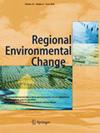“你们谈论的是威胁,但我们想到的是安慰”:在冰岛经历雪崩威胁的偏远小社区中,地方依恋的作用
IF 3.4
2区 环境科学与生态学
Q2 ENVIRONMENTAL SCIENCES
引用次数: 0
摘要
据冰岛气象局称,气候变化可能会增加该国发生雪崩等自然灾害的可能性、强度和频率。因此,必须加强对气候变化相关影响的准备。直到最近,气候变化相关危害的社会和社区方面在冰岛还没有受到太多关注。本研究的目的是探讨地方依恋在冰岛小型偏远社区的作用,以及居民如何体验雪崩的威胁。通过叙述的方法,我们对西峡湾两个社区的居民和焦点小组进行了采访。我们的研究结果表明,这两个社区都表现出高度的地方依恋,特别是在自然和社会方面。地方依恋的积极影响转化为志愿服务和地方参与的意愿,这可以增强准备和加强能力建设。虽然我们在这两个地方都发现了地方依恋的负面倾向,例如,尽管存在风险,居民并不认为他们的社区是脆弱的,但它们似乎没有积极方面那么突出。居民表现出传统的地方知识,但有必要更好地将社区的新来者和外国人纳入应急规划。本文章由计算机程序翻译,如有差异,请以英文原文为准。
“You talk of threat, but we think of comfort”: the role of place attachment in small remote communities in Iceland that experience avalanche threat
Abstract According to the Icelandic Meteorological Office, climate change may increase the likelihood, intensity, and frequency of some natural hazards in the country, such as avalanches. It is therefore essential to increase preparedness for climate change–related effects. Until recently, social and community aspects of climate change–related hazards have not received much attention in Iceland. The aim of this study was to explore the role of place attachment in small remote communities in Iceland and how residents experience the threat of avalanches. Through a narrative approach, we conducted interviews with residents and focus groups in two communities in the Westfjords. Our findings suggest that both communities show a high level of place attachment, in particular with regard to the natural and social dimension. A positive impact of place attachment translates into willingness for volunteering and local engagement, which can increase preparedness and enhance capacity building. While we found negative tendencies of place attachment in both places, for example in that residents do not consider their communities vulnerable despite the risk, they seem to be less prominent than the positive aspects. Residents exhibit traditional local knowledge, but there is a need to better integrate newcomers and foreigners in the communities into emergency planning.
求助全文
通过发布文献求助,成功后即可免费获取论文全文。
去求助
来源期刊

Regional Environmental Change
环境科学-环境科学
CiteScore
6.80
自引率
2.40%
发文量
125
审稿时长
4.5 months
期刊介绍:
Environmental changes of many kinds are accelerating worldwide, posing significant challenges for humanity. Solutions are needed at the regional level, where physical features of the landscape, biological systems, and human institutions interact.
The goal of Regional Environmental Change is to publish scientific research and opinion papers that improve our understanding of the extent of these changes, their causes, their impacts on people, and the options for society to respond. "Regional" refers to the full range of scales between local and global, including regions defined by natural criteria, such as watersheds and ecosystems, and those defined by human activities, such as urban areas and their hinterlands.
We encourage submissions on interdisciplinary research across the natural sciences, social sciences and humanities, and on more focused studies that contribute towards the solutions to complex environmental problems. Topics addressed include (i) the regional manifestations of global change, especially the vulnerability of regions and sectors; (ii) the adaptation of social-ecological systems to environmental change in the context of sustainable development; and (iii) trans-boundary and cross-jurisdictional issues, legislative and governance frameworks, and the broad range of policy and management issues associated with building, maintaining and restoring robust social-ecological systems at regional scales.
The primary format of contributions are research articles, presenting new evidence from analyses of empirical data or else more theoretical investigations of regional environmental change. In addition to research articles, we also publish editorials, short communications, invited mini-reviews on topics of strong current interest, as well as special features that provide multifaceted discussion of complex topics or particular regions
 求助内容:
求助内容: 应助结果提醒方式:
应助结果提醒方式:


